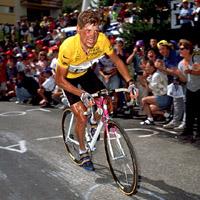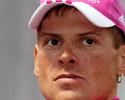Jan Ullrich retrospective, Wednesday, February 28
Jan Ullrich: A career of highs and lows
During a professional career that spanned 12-years, Germany's Jan Ullrich experienced all of the highs and lows of cycling. From the glory of his 1997 Tour de France win to the damaging accusations that saw him thrown out of the event and from his team just nine years late. Following his official retirement from competitive cycling earlier this week Cyclingnews' Susan Westemeyer recounts Ullrich's career.

|
Jan Ullrich first came to public notice in 1993, when he won the Amateur road title in Oslo, Norway, as a 19 year-old, the youngest ever to win that title. He signed his first professional contract with Team Telekom in 1995, winning the national time trial title that year.
But Ullrich really burst on to the scene in 1996, when he finished second in his first Tour de France, and very nearly stole victory from his captain Bjarne Riis. The next year Ullrich entered the history books at that event, when he became the first German rider to ever win the Tour, winning two stages along the way.
Such is the events importance that it thrust instantaneous fame upon Ullrich and a great future was predicted for the young rider. While some in his homeland touted the German as the "Tour God" following that victory, the tag proved premature just 12-months later when, despite winning two stages, he finished second overall to Marco Pantani.
He did not participate in the 1999 edition, allegedly because of knee problems, but as he admits in his autobiography it was actually due to a total lack of motivation. "I had absolutely no more interest in cycling," he noted.
Not long after he admitted that to himself, Ullrich's interest sparked again and his passion for the sport began to burn brighter than ever before. He resumed training and decided to ride the Vuelta a España as training for the World Championships. Evidently the break did him good, he won not only the Vuelta but also the world time trial title later that year.
The next two years brought more results than most riders achieve in a lifetime: he finished second in the Tour de France another two times, won a Gold Medal in the 2000 Sydney Olympics road race and a silver in the Olympic time trial, claimed victory in the German national road title and once again claimed the World time trial championship.
But then in 2002, things went downhill - rapidly. Knee problems prevented him from racing and training. Bored and frustrated, his problems were compounded when he lost his licence for drunken driving after crashing his Porsche 911, ironically into a bicycle rack.
Shortly thereafter Ullrich underwent knee surgery. He was discontent with his recovery during rehabilitation, and during that period, while at a disco with friends, he took some pills that he thought would improve his mood.
He has never released the name of the person who gave him the pills or identified the drug but the damage was done. The very next morning he was subject to an out-of-competition doping test, which came back positive.

|
The team suspended Ullrich immediately and the positive test ultimately led to the pair parting ways as he served a six-month suspension. Ullrich returned to the sport in 2003 with the small German Team Coast, which was owned by Gunther Dahms, owner of a chain of clothing stores. Dahms' love of cycling was deeper than his pockets, as it struggled with unpaid salaries and periodically had its license suspended.
On the eve of achieving his greatest dream, participation in the Tour de France, Dahms lost the team and sponsorship was taken over by Bianchi. Wearing the celeste blue jersey, Ullrich finished second again in the Tour behind Lance Armstrong, but came closer to beating him than ever - finishing exactly one minute and one second down.
But that was the end of Team Bianchi and Ullrich ultimately returned to Team Telekom.
He won the Tour de Suisse in 2004 but that year Ullrich suffered his worst finish ever in the Tour de France when he crossed the final stage in fourth, while teammate and good friend Andreas Klöden took the second place.
The following year saw Ullrich move up one step on the podium at the Tour, finishing third behind Armstrong and Ivan Basso.
In 2006, Ullrich started the Giro d'Italia for only the second time in his career, and he won the event's time trial stage. In his preparations to claim the first Tour de France without Lance Armstrong, Ullrich won the overall Tour de Suisse title.
As the German looked in strong form to claim that elusive second Tour de France title, the Spanish investigators were breaking Operación Puerto wide open and things were destined for a disastrous end when Ullrich was added to the list of alleged riders involved with Dr Eufamiano Feuntes.
Ullrich denied any involvement with Dr Eufamiano Feuntes from the beginning but on the eve of his trademark event - the Tour de France - the Operación Puerto topic suddenly exploded.
At 9:34am that Friday morning, cycling was hit by the unthinkable as Ullrich, along with teammate Oscar Sevilla and directeur sportif Rudy Pevenage were informed of their indefinite suspension by the T-Mobile team. Standing by its desire to keep cycling clean, T-Mobile management said it had no other option but to suspend the trio after claiming to have been shown damning evidence against them by Tour organiser ASO.
Ullrich, who has resided in Switzerland in recent years, was subsequently the subject of an investigation by Swiss Cycling, which had issued his license. The investigation is ongoing.
In addition, the German public prosecutor announced an investigation on fraud charges. The investigation involved a search of Ullrich's house in Switzerland, and a DNA test.
Ullrich's attorneys have filed a prevention order in Switzerland to stop the transfer of evidence taken into custody during the house search to German investigators and the legal team had also attempted to stop the transfer of evidence or documents from Spain. However, a Spanish court denied that request the end of last week.
Operación Puerto has become so convoluted that it's possible we may never know who was actually involved and to what extent their involvement was. But one thing is for sure, following his announcement on Monday, Jan Ullrich has donned the Tour de France's yellow jersey for the last time.
Photography
For a thumbnail gallery of these images, click here
Images by John Pierce / Photosport International
- Jan Ullrich retires from cycling after an alleged doping scandal.
- Jan Ullrich climbs Alpe d'Huez on his way to victory in the 1997 Tour de France.

